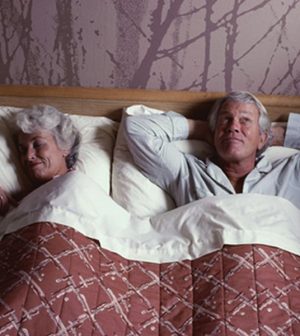- Could Your Grocery Store Meat Be Causing Recurring UTIs?
- Are You Making This Expensive Thermostat Error This Winter?
- Recognizing the Signs of Hypothyroidism
- 10 Strategies to Overcome Insomnia
- Could Artificial Sweeteners Be Aging the Brain Faster?
- Techniques for Soothing Your Nervous System
- Does the Water in Your House Smell Funny? Here’s Why
- Can a Daily Dose of Apple Cider Vinegar Actually Aid Weight Loss?
- 6 Health Beverages That Can Actually Spike Your Blood Sugar
- Treatment Options for Social Anxiety Disorder
Bed Partner Often Fuels Loved One’s Insomnia

If your bed partner routinely struggles to fall asleep, you probably have some well-meaning advice.
But it may be best to keep it to yourself.
Australian sleep specialists found that when a loved one had insomnia, the partner’s suggested solutions — including watching TV or going to bed earlier — often backfired.
“It is possible that partners are unwittingly perpetuating insomnia symptoms in the patient with insomnia,” said study author Alix Mellor.
Mellor, a postdoctoral research fellow, is coordinator of the Researching Effective Sleep Treatments (REST) project at Monash University in Victoria.
People with insomnia have trouble falling asleep or staying asleep, which can lead to daytime fatigue and irritability.
Mellor’s team’s surveyed 31 partners of insomnia patients who were seeking treatment for their sleep problem.
Roughly three-quarters said they suggested that their sleep-deprived partner go to bed early and/or wake up late. But neither behavior is considered helpful for insomnia, the researchers said.
More than 40 percent also said they promoted bedtime activities other than sleep, such as reading or TV-viewing. And more than one-third said they suggested that their sleep-deficient partner take naps, consume caffeine or cut back on daytime activities.
None of those ideas are embraced as good ideas by sleep experts, either.
Bed partners also made accommodations that affected their own sleep or daytime alertness, the researchers found.
“Our preliminary results suggest that while some of these behaviors make the patient feel supported, their partner may be experiencing more anxiety,” Mellor said in a news release from the Associated Professional Sleep Societies.
Assessing a bed partner’s behaviors might help sleep specialists devise more effective treatments, she suggested.
The study results appear in a June 5 online supplement to the journal Sleep. They were also presented this week at a meeting of the Associated Professional Sleep Societies, in Boston.
More information
There’s more on the importance of sleep at the U.S. National Heart, Lung and Blood Institute.
Source: HealthDay
Copyright © 2026 HealthDay. All rights reserved.










